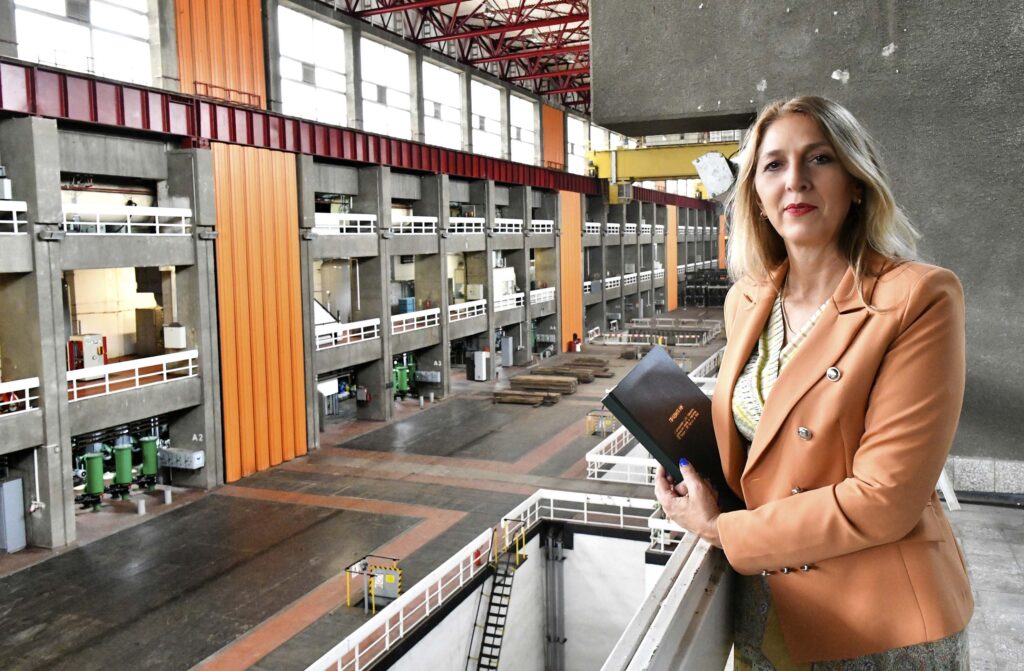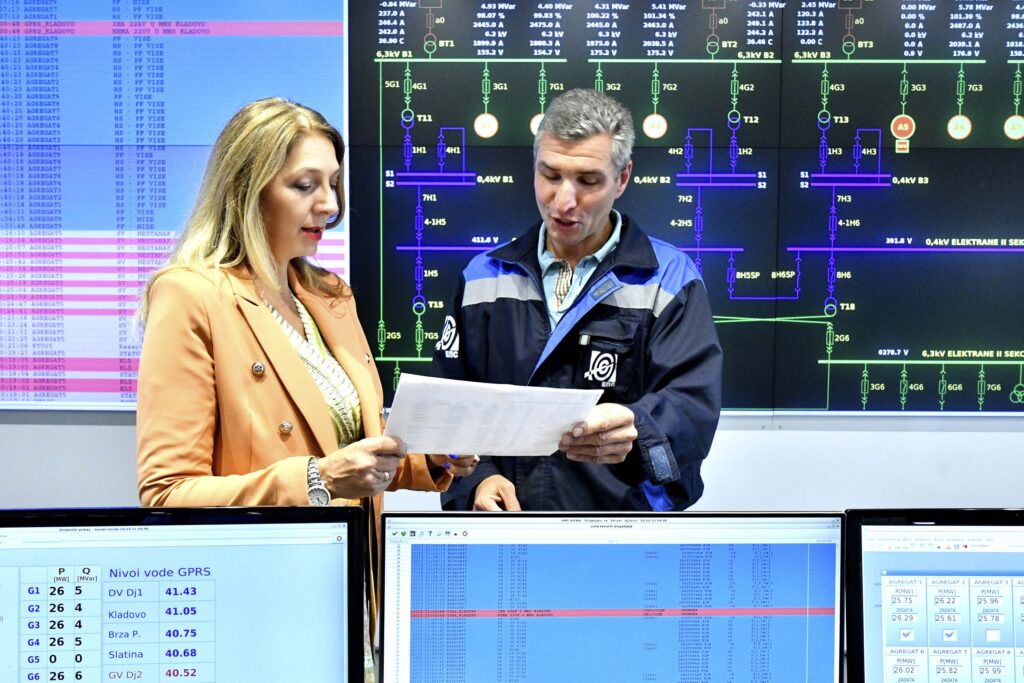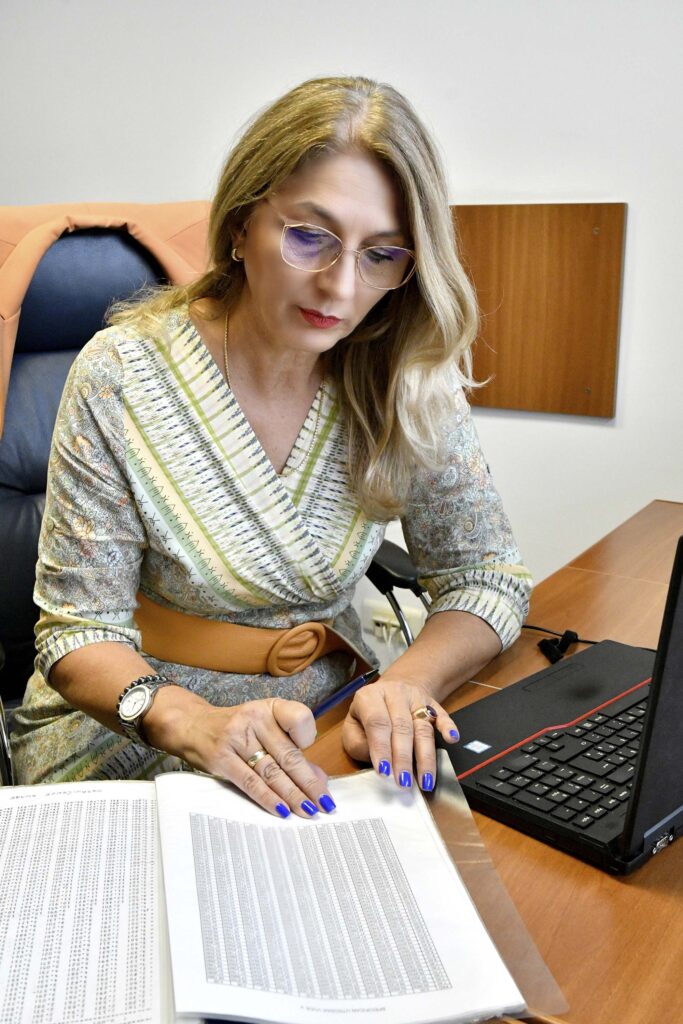Ms. Gordana Jugović is an independent dispatch engineer at Đerdap 2 Hydro Power Plant and has been successfully building a career in one of the most important hydro power plants within Electric Power Industry of Serbia system for 33 years. A number of women within power sector has been growing, but not much is known about them. Gordana’s job at the hydro power plant in Negotin is very responsible and often crucial at key moments for our power sector.
As a girl how did you decide to enroll at a technical faculty?
– I graduated high school in Negotin, as the first generation of the vocational education. After two years of common basics, I chose the mathematics major, the profession of mathematician and statistician. I have always had wide and varied interests. Starting with music – without which I couldn’t imagine my life path, applied art, chess, etc. Somehow, I managed all that, without difficulties. Sciences, more specifically, mathematics and physics, were something that I liked the most, and before enrolling at the university, I chose electrical engineering – power engineering. That was challenging enough and solidly difficult for me. I have been always giving myself difficult, serious tasks, testing myself. I have never given up on anything and persistence is one of my traits. Today I can say that I did not make a mistake in my choice of profession and if I had to choose again, I would change almost nothing.
Has working at EPS always been your business desire or did you get a job at PE EPS in the hydro sector specifically due to a combination of circumstances?
– I enrolled at the faculty in 1981. Our largest hydro power plant Đerdap 1 had already been built, and the second one on the Danube river was under construction. I applied for and received a scholarship from Đerdap HPP. After graduation, I received an invitation and started working at Đerdap 2 HPP. This was also my wish during my studies, to work in the hydro sector, at a power plant. Due to life and family circumstances, I stayed in Negotin, the city where I grew up.

What does your job actually look like, namely the hydro power plant where you work? What exactly is your job?
– My first position was within the Technical Service of Đerdap 2 HPP. From the beginning, even as an intern, I was in charge of maintaining the auxiliary equipment of the power plant and external facilities. This was been dynamic and interesting, especially in the first years. The opportunity to change something arose at the end of 2000 and I moved to the Power Plant Exploitation, where I am still today. My position is an Independent Dispatch Engineer. I organize and coordinate the operations within the Service for Power Plant and Navigation Lock Exploitation of the Đerdap 2 HPP branch. I plan the optimal operation of the power plant from the position of hydro power potential use, harmonizing the power plant operation with the valid regulations and guidance. I cooperate with the partner from Romania, dispatch center at Đerdap 1 HPP and dispatch center at EPS when determining daily generation plans. In the event of floods, I monitor, analyze and determine hydropower parameters related to the operation of the power plant and evacuation facilities – spillway bays. As a member of the joint dispatch service for energy sector of Đerdap HPP and Portile de Fier, I prepare the necessary documentation and data for the work of the Mixed Committee for Đerdap related to the sharing of potential with Romania.
Đerdap 2 hydropower plant is located at the 863rd kilometer, 80 km downstream from Đerdap 1. Actually, there are three power plants on the Đerdap 2 profile: the Romanian one with 8 units, the Serbian main power plant with 8 units and the Serbian additional power plant with two units. Between the main and the additional power plant, there are 7 Serbian spillway bays and a Serbian navigation lock. The main facility is 1,017 meters long and 78.4 meters wide. The management building of the power plant is on the riparian area, and the command tower, where my office and part of my division is, is somewhere halfway up the Danube, above the plant itself. My office on the eighth floor has a view of the Danube, the left Romanian and the right Serbian coast, as well as the most beautiful sunrise view when the morning sky is clear. During low water levels, when the inflows at the Danube are lower than 2,300 m³/s, the sunken German fleet from the Second World War can be clearly seen.
Cooperation with the dispatch department of Đerdap 1 HPP and the dispatch service of EPS means that I am available 24 hours a day and after the end of my shift I am still on call. It often happens that the daily plan made during working hours has to be adjusted in the afternoon or evening for various reasons. In that case, reprogramming is done without delay in order to maintain the optimal electricity generation conditions the following day. In addition to being on call from home, my job also requires occasional overtime on weekends and holidays.

How hard is it to be a woman in such a large system?
– When the work is well organized, it is not difficult to work in a large system. When you have clear instructions and procedures, when you know how the entire system works, which procedures are to be implemented in regular and which in unforeseen circumstances, when you have a professional, well-trained team where almost every member can be replaced by another member, when communication is good, there are no problems. Therefore, being a woman in such a large system, which is in close connection with the Romanian system, is not difficult at all.
Did you always feel as an equal part of the team? Were there moments when the belief prevailed that these jobs are actually meant for men?
– Gender equality is now an everyday topic. I started working in the previous century, in 1989, and at that time Đerdap 2 HPP was not yet completely finished. An unwritten rule was that young engineers upon employment and after an internship and training, go to work as a shift engineer on duty. At that time, it was very serious job and not an easy one. While working in shifts, particularly in the second and third shift, the engineer on duty was responsible for taking care of the entire power plant, dealing with malfunctions that could occur at any moment, for calling the team to intervene, he was always to react without delay and in the right way, because errors can be insurmountable. As a young engineer, I couldn’t do a shift, and the only reason was that I was a young woman. It bothered me a lot then. It was the first time I felt that kind of “discrimination”. Before that, during my education, at the university, in my family, at home, I never had different treatment and tasks than any other person of the opposite gender. When I was young and inexperienced, I was taken aback by the occasional unequal distribution of jobs. But, I was not discouraged. I always tried to give my best.
There are moments and jobs, especially in hydro power plants, which are generally difficult for women. Those are mostly jobs requiring physical readiness and strength. When it comes to expertise jobs, technical, organizational, management, there is no difference – no jobs more suitable for one gender or the other. What is important is the effort and the quality of tasks performed. This is my belief. Some form of injustice and discrimination in business is more pronounced in smaller communities and smaller teams. I have had the opportunity to work with great female colleagues, intelligent, competent, top experts, whose work has never been adequately rewarded, nor have, unfortunately, their capabilities been suitably utilized. I sometimes joke that we are not equals, but that men should fight for equality.

How do you manage to balance your job and private obligations as a woman?
– It is important to have strength, both professionally and interpersonally. Good organization, optimism, self-confidence, self-discipline, ability to adapt, persistence, tolerance, they are just some of traits necessary to harmonize and fulfill all obligations and expectations. Both at work and in private life. My work day starts before 6.00 a.m. and ends around midnight. I try to make everything I do impeccable, make it fast, accurate, precise, of high-quality, and incorporate a part of myself into everything I do. My greatest achievement is not my profession, but my two daughters. The older one, a pharmacist, is already a mother of a beautiful two-year-old girl, and we are expecting another family member at the beginning of next year. The younger one studies psychology. After my husband died nine years ago, I also inherited his private business. I managed to balance it all, my job, family obligations and the activities of a private entrepreneur, with great effort, a lot of self-control and sacrifice. It was arduous, but successful.
How would you motivate girls to study in the fields of energy sector, particularly RES?
– My two daughters chose different professional paths than mine. I regret not being able to motivate them to choose their higher education in technical sciences, but they certainly had, and continue to have, my support in choosing their vocation. Energy sector was auspicious even at the time when I opted for it as my profession. Today, it is apparent that the energy sector is the future. Not only locally, but globally. Improvement, development and investment in RES will be particularly important, especially with global attitudes and goals pertaining carbon neutrality. It seems to me that the youth is insufficiently informed. Both young men and young women. Which seems strange, since they have almost any information at their fingertips. It is necessary to inform high school students through lectures, workshops, advertisements and introduce them to the expertise. Bring it home to them. Universities, people from energy sector and RES sector should cooperate with high schools and present high school graduates with what is happening in the energy sector, especially RES. The number of potential female students of technical faculties would certainly increase. Female graduates should be explained the great potential for developing a stable career in the energy sector, as well as that significant investments can be expected there, especially now when there is not enough energy. It should be explained to young girls that the energy sector is huge, that the prospects for employment are significant, participation in numerous, large, demanding and interesting projects is almost certain, and cooperation with colleagues world-wide is excellent, meaning that the possibility of career advancement happens fast.


